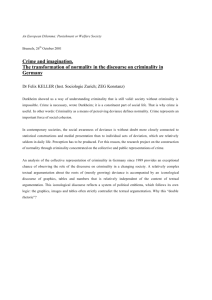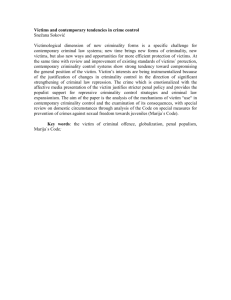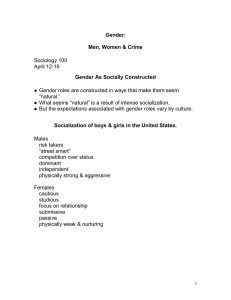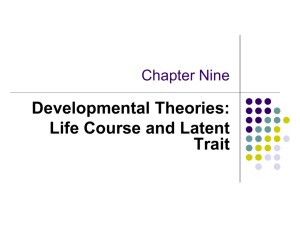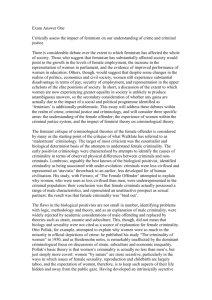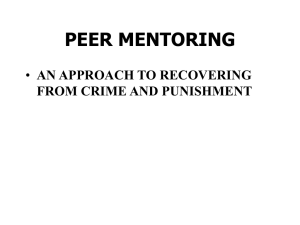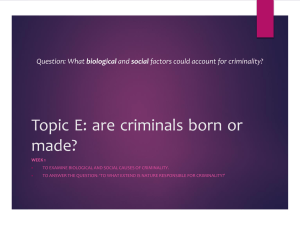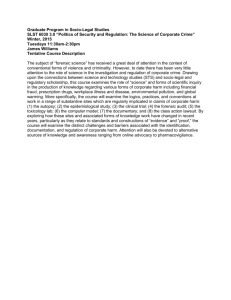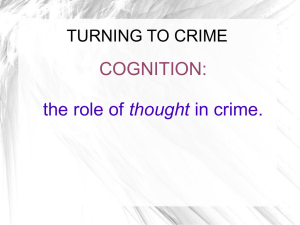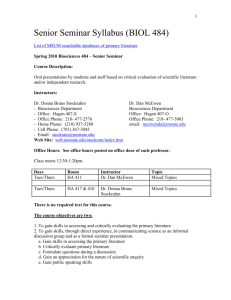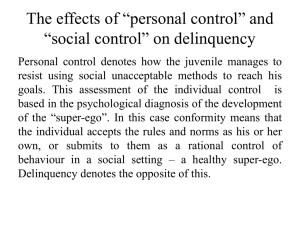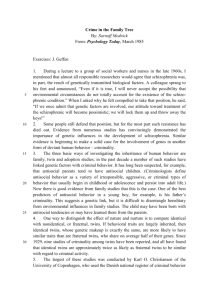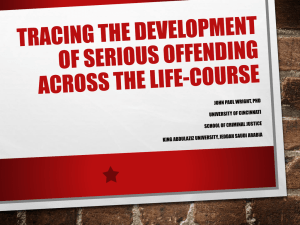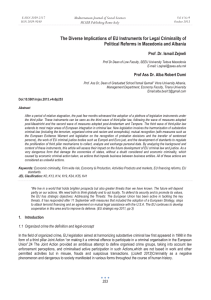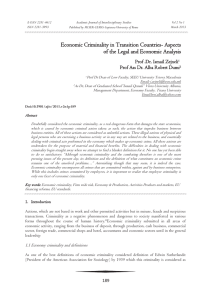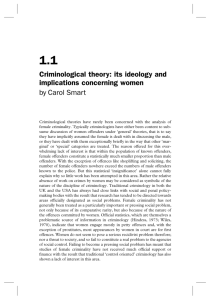CJ 400 Syllabus
advertisement
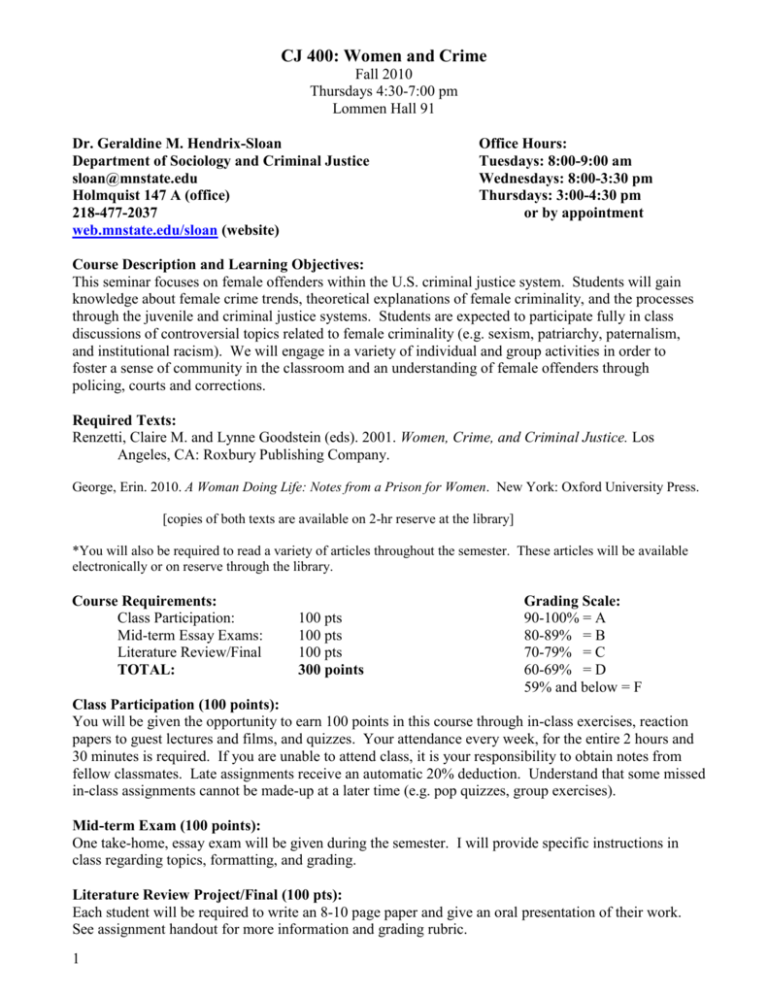
CJ 400: Women and Crime Fall 2010 Thursdays 4:30-7:00 pm Lommen Hall 91 Dr. Geraldine M. Hendrix-Sloan Department of Sociology and Criminal Justice sloan@mnstate.edu Holmquist 147 A (office) 218-477-2037 web.mnstate.edu/sloan (website) Office Hours: Tuesdays: 8:00-9:00 am Wednesdays: 8:00-3:30 pm Thursdays: 3:00-4:30 pm or by appointment Course Description and Learning Objectives: This seminar focuses on female offenders within the U.S. criminal justice system. Students will gain knowledge about female crime trends, theoretical explanations of female criminality, and the processes through the juvenile and criminal justice systems. Students are expected to participate fully in class discussions of controversial topics related to female criminality (e.g. sexism, patriarchy, paternalism, and institutional racism). We will engage in a variety of individual and group activities in order to foster a sense of community in the classroom and an understanding of female offenders through policing, courts and corrections. Required Texts: Renzetti, Claire M. and Lynne Goodstein (eds). 2001. Women, Crime, and Criminal Justice. Los Angeles, CA: Roxbury Publishing Company. George, Erin. 2010. A Woman Doing Life: Notes from a Prison for Women. New York: Oxford University Press. [copies of both texts are available on 2-hr reserve at the library] *You will also be required to read a variety of articles throughout the semester. These articles will be available electronically or on reserve through the library. Course Requirements: Class Participation: Mid-term Essay Exams: Literature Review/Final TOTAL: 100 pts 100 pts 100 pts 300 points Grading Scale: 90-100% = A 80-89% = B 70-79% = C 60-69% = D 59% and below = F Class Participation (100 points): You will be given the opportunity to earn 100 points in this course through in-class exercises, reaction papers to guest lectures and films, and quizzes. Your attendance every week, for the entire 2 hours and 30 minutes is required. If you are unable to attend class, it is your responsibility to obtain notes from fellow classmates. Late assignments receive an automatic 20% deduction. Understand that some missed in-class assignments cannot be made-up at a later time (e.g. pop quizzes, group exercises). Mid-term Exam (100 points): One take-home, essay exam will be given during the semester. I will provide specific instructions in class regarding topics, formatting, and grading. Literature Review Project/Final (100 pts): Each student will be required to write an 8-10 page paper and give an oral presentation of their work. See assignment handout for more information and grading rubric. 1 PLEASE BRING TO MY ATTENTION ANY DIFFICULTIES YOU MAY HAVE REGARDING TEST-TAKING OR WRITING ABILITY - HELP IS AVAILABLE MSUM Write Site = call 218-477-5937 for hours and locations The Counseling Center = Bridges 260 – 218-477-2227; or 701-235-7335 (24-hr hotline) Students with disabilities who believe they may need an accommodation in this class are encouraged to contact Greg Toutges, Coordinator of Disability Services at 477-5859 (Voice) or 1-800-627-3529 (MRS/TTY), CMU 114 as soon as possible to ensure that accommodations are implemented in a timely fashion. MSUM Academic Honesty Policy: “In academic work, students are expected to present original ideas and give credit for the ideas of others…When an instructor has convincing evidence of cheating or plagiarism, the following actions may be taken: assign a failing grade for the course…or report the offense, the evidence, and their action to the Dean of their college or the VP for Academic Affairs” (MSUM Student Handbook, 2008). NO USAGE OF CELLULAR PHONES, IPODS, OR OTHER ELECTRONIC DEVICES ALLOWED IN CLASS WITHOUT MY CONSENT. LAPTOP COMPUTERS MAY BE USED DURING CLASS FOR NOTE-TAKING PURPOSES ONLY (not for email, surfing, working on other coursework, etc.) Course Schedule and Assigned Readings 8/26: Introductions 9/2: Women and Criminality: UCR Crime Data and Trends: Read Chapters 1 and 13 9/9: The Typical Female Offender, Race/Ethnicity and Socio-economic Status: Read assigned articles 9/16: Prostitution: Read Chapter 5 & assigned article; Prostitution essay due 9/23: Discuss Literature Review assignment – trip to library 9/30: Girls and Gangs: Read Chapter 4; Gender and Violence: Read Chapter 6 10/7: “Monster” film screening; The Intersection of Criminality and Victimization: Read Chapter 16 10/14: Gender Gap in Criminality: Read Chapter 8 and Adler E.R. article; Receive mid-term exam 10/21: Gender and Policing: Read Chapter 18 and Messerschmidt E.R. article; Mid-term exam due! 10/28: Gender and Courts: Read Chapters 14 and 15; guest speaker 11/4: Probation and Intermediate Sanctions: Read Chan et al. and Sutin et al.; “Sherry Baby” film 11/11: Correctional Facilities: Read Chapter 17 and Deschenes et al. 11/18: NO CLASS – ASC Conference Presentation in San Francisco [Read “A Woman Doing Life”] 11/25: NO CLASS – Fall Break [Read “A Woman Doing Life”] 12/2: In-class student presentations/discussions; summary of course 12/10: Final Exam Paper Due by 3:00 pm Note: This course is organized loosely around the following journey toward understanding female criminality: (1) What are the types of crimes most often committed by female offenders? (2) Who are the typical female offenders? (3) Why do women commit crime, and at a far lower rate than men? (4) How does/should the CJS deal with female offenders? For this reason, I have assigned readings that are out of sequence in your text. Also, many of the chapters focused on issues of female victimization are omitted from this course, because it is beyond the scope of this course to examine fully the issue of victimization. *This syllabus is subject to change. I reserve the right to modify readings, test dates, and assignments. 2
